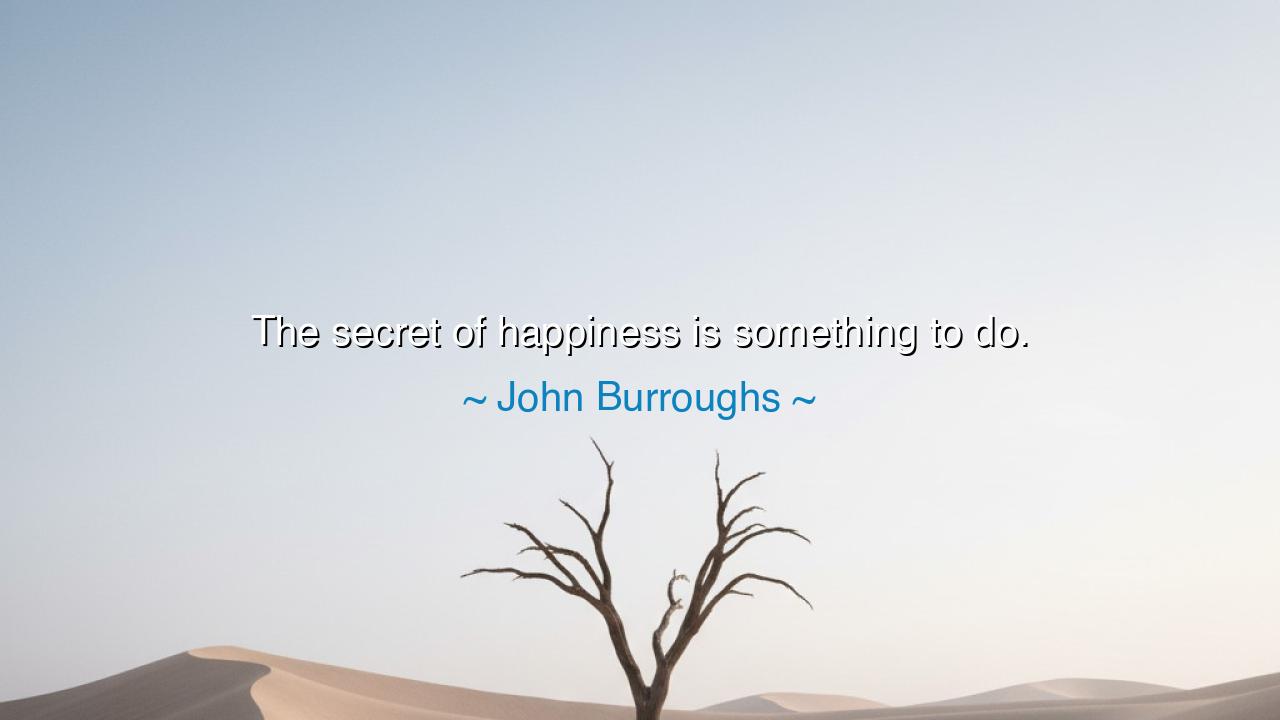
The secret of happiness is something to do.






Hear now the wisdom of John Burroughs, the naturalist and philosopher of the American wilderness, who once said: “The secret of happiness is something to do.” In this simple yet profound truth lies the rhythm of all life. For happiness, he teaches, is not found in idleness or luxury, but in purpose — in the steady labor of hands, the patient striving of the heart, the devotion of the mind toward some worthy task. Those who wander through life seeking joy as a gift from without will find only shadows; but those who turn their energy toward creation, service, or growth will discover that joy rises naturally, like sunlight after dawn.
Burroughs, who walked the hills and valleys of New York in the nineteenth century, knew that the human soul, like the earth itself, is meant for cultivation. He spent his life observing the quiet majesty of nature — the hum of bees, the turning of leaves, the flight of birds — and through these humble wonders he found the great law of contentment. In the stillness of his solitary walks, he learned that the mind grows restless when it is empty and finds peace when it is engaged. To have something to do, something that calls forth effort and attention, is to be alive in the fullest sense. For as the heart beats to keep the body alive, so does purpose keep the spirit whole.
Many seek happiness in comfort, believing it lies in leisure, ease, or the absence of struggle. Yet this is a misunderstanding. Idleness, though sweet at first, soon sours into emptiness. The soul, like a river, must move or it will stagnate. Even the gods of old were not idle — they forged the stars, guided the winds, and shaped destinies. Burroughs reminds us that it is activity, not rest, that gives life meaning. To work with love, to strive with sincerity, to lose oneself in a task greater than one’s sorrow — this is the secret by which happiness renews itself endlessly.
Consider the life of Florence Nightingale, who during the Crimean War faced filth, disease, and despair in the field hospitals of battle. She could have turned away from suffering, yet she chose instead to act. Each day, she labored to bring cleanliness, order, and care where chaos reigned. Her something to do was service; her happiness, born not from ease but from the courage to give. When she walked the wards by lamplight, her presence brought comfort to thousands. Her joy was not in the absence of hardship, but in the purpose that gave her suffering meaning. So it is with all who labor in the service of life — their happiness glows like a flame against the dark.
Even in our ordinary days, this truth endures. The craftsman at his bench, the mother tending her child, the student deep in study — each finds in their work a quiet fulfillment that idleness can never offer. It is not the grandeur of the task that matters, but the devotion with which it is done. To live each day with intention, to wake with a reason to move, to create, to help — this is to dwell in the state of happiness. The heart that has something to do has no time to despair.
Burroughs’ wisdom also holds a warning for the modern soul, which is too often distracted by the illusions of pleasure. We chase entertainments, possessions, and acclaim, believing they will fill the void within — but without purpose, they only deepen it. The mind that is unanchored drifts into sorrow; the will that has no goal withers. Therefore, to heal the heart, one must act. Find something to do that calls to the soul — a craft, a duty, a dream, or a service — and pour yourself into it. For in that labor, happiness will awaken not as a prize, but as a companion.
So, my child, remember this teaching: happiness is not a place one arrives at, but a path one walks. Do not wait for joy to descend upon you like the morning dew; create it through motion, through effort, through care. When life feels empty, fill it not with indulgence but with action. Help another. Build something. Learn something. Plant seeds — in the earth, or in the hearts of others. For the soul that works with love never wanders in darkness.
Thus spoke John Burroughs, whose wisdom was carved from the quiet earth itself: “The secret of happiness is something to do.” Let your life, then, be a continual act of creation and kindness. In doing, you will find becoming; in serving, you will find peace. For to have something to do — something good, something meaningful — is to hold in your hands the key to joy itself.






AAdministratorAdministrator
Welcome, honored guests. Please leave a comment, we will respond soon